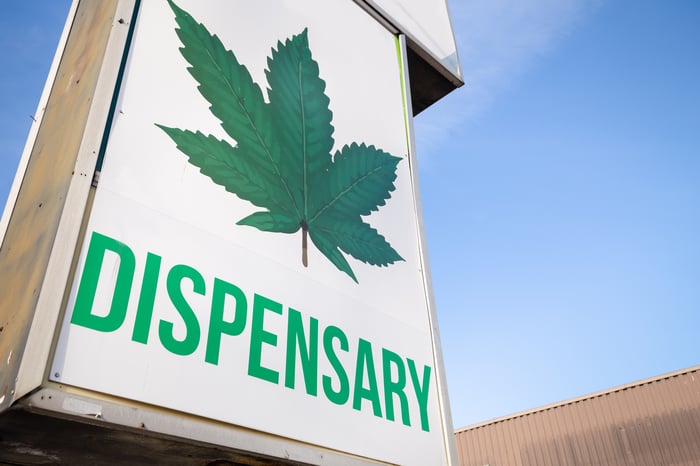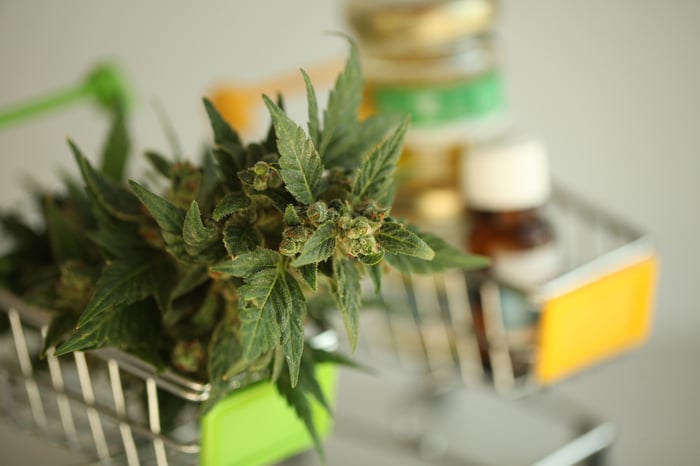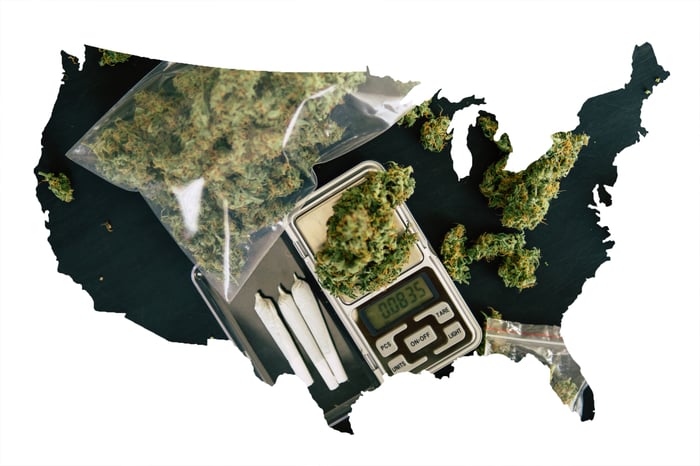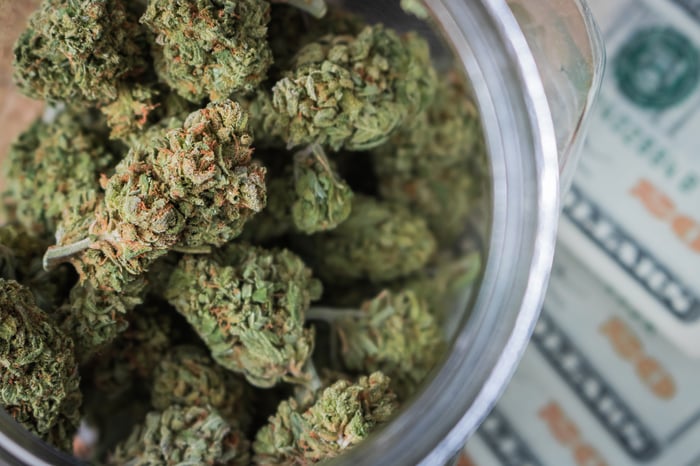The marijuana industry is budding into a big-money business, with both Wall Street and investors taking notice. Depending on your preferred Wall Street source, the legal cannabis industry could be generating anywhere from $50 billion to $200 billion in annual sales in about a decade's time. For context, worldwide sales in 2018 totaled only $10.9 billion, according to the duo of Arcview Market Research and BDS Analytics.
But when discussing global sales, we're really talking about the potential of the U.S. market. Even the most aggressive growth estimate, which calls for $200 billion in sales a decade from now, suggests that the United States could be responsible for half ($100 billion) of this revenue. This puts vertically integrated U.S. dispensary stocks squarely in the middle of what could be one of the biggest growth trends in the U.S. over the next decade.
Given the growth potential for U.S. dispensary stocks, it should come as little surprise that investors cheered the transformative acquisition announced by Curaleaf Holdings (CURLF 4.41%) on Wednesday, July 17. The deal, valued at $875 million, will see Curaleaf acquire GR Companies (better known as Grassroots), the largest privately held vertically integrated multistate cannabis company.
As you can imagine, Curaleaf's acquisition -- its second large purchase of the year -- is expected to shake up the U.S. dispensary landscape. Here's a comprehensive look at what investors can now expect when analyzing vertically integrated U.S. dispensary stocks.

Image source: Getty Images.
These dispensary stocks have the most retail licenses
Probably the biggest question is which dispensary stocks hold the most retail licenses. The thinking here is that companies that hold the most dispensary licenses will be set to reach tens of millions of Americans and rapidly grow sales.
On a pro forma basis (i.e., assuming that all pending acquisitions close), Curaleaf will see its retail license count nearly double from 70 licenses to 131 licenses, with Grassroots adding 61 retail licenses, as well as 17 combined cultivation and processing sites.
Interestingly enough, though, this isn't enough to put Curaleaf in the lead in terms of total retail licenses held. That honor goes to Harvest Health & Recreation (HRVSF), which only has a handful of operational stores for the time being, but has acquired a laundry list of retail, cultivation, and processing licenses via acquisition. Primarily due to its $850 million acquisition of Verano Holdings, Harvest Health has licenses to open as many as 142 marijuana dispensaries.
Beyond Harvest Health and Curaleaf, Green Thumb Industries, Acreage Holdings (ACRGF), and MedMen Enterprises (MMNFF) all have close to 90 retail license (on a pro forma basis).

Image source: Getty Images.
These U.S. dispensary stocks have the most operational stores
Of course, there's a big difference between having retail licenses and actually having open dispensaries that are generating revenue. Harvest Health & Recreation may be the clear license leader, but it's nowhere near the top when it comes to currently operational retail locations.
Assuming the closure of its Grassroots acquisition, Curaleaf is in pole position to have the most operational dispensaries. Grassroots has 20 operational stores today, which when combined with Curaleaf's four dozen open stores would give Curaleaf a whopping 68 open locations. No other dispensary operator is even remotely close.
MedMen, which is in the process of acquiring privately held PharmaCann for $682 million in an all-stock deal, has 86 retail license on a pro forma basis, but more importantly has 37 locations already open, including 11 from PharmaCann. That means Curaleaf would have nearly twice as many open dispensaries as Medmen, the next-closest multistate operator.

Image source: Getty Images.
Which dispensaries operate in the most states?
Another pretty substantive difference when analyzing U.S. vertically integrated dispensary operators is the number of states they hold licenses in. As a reminder, since cannabis is federally illicit, interstate transport of the drug isn't allowed. That's why holding retail, cultivation, and processing licenses in multiple states can be so important for these companies.
When the Grassroots acquisition is complete, Curaleaf will hold a presence in 19 states, up from its current 12 states. These new markets include the recreationally legal Michigan, as well as Arkansas, North Dakota, and Oklahoma. But as with the aggregate retail license figure above, Curaleaf is trumped by one of its peers.
Acreage Holdings, which has agreed to be acquired by Canopy Growth on a contingent-rights basis for $3.4 billion if the U.S. legalizes marijuana at the federal level, actually has retail, grow farm, and processing licenses in 20 states. This diverse presence in the U.S. is likely a big reason why Canopy Growth was willing to pony up billions to acquire Acreage Holdings.

Image source: Getty Images.
Which dispensaries generate the most revenue?
Perhaps the hardest question to answer is which multistate operators will be generating the highest sales. The reason that's such a difficult question to answer is because there are numerous pending acquisitions of privately held businesses throughout the industry. But at the moment, it looks like Curaleaf is the runaway revenue leader.
According to an investor presentation from Curaleaf that takes into account its nearly $950 million acquisition of Cura Partners' Select brand, as well as the Grassroots purchase, it would have reported $256 million in pro forma sales in 2018. The next-closest dispensary operator is Florida's Trulieve Cannabis at roughly $103 million in 2018 sales.
An equally important question is what might happen when 2020 rolls around. According to Wall Street, the dispensary operator that could give Curaleaf the biggest run for its money is Cresco Labs (CRLBF 6.83%). Even though Cresco Labs holds fewer than five dozen retail licenses in close to a dozen states, it's in the process of acquiring Origin House for what was announced as an $823 million all-stock deal. As one of the few holders of cannabis distribution licenses in California, Cresco Labs will be able to use Origin House to place its in-house-branded pot products into more than 500 California dispensaries. The $711 million in sales forecast by Wall Street in 2020 could be a high-water mark among U.S. dispensary stocks.
Suffice it to say, with acquisition activity not slowing, investors should expect the U.S. dispensary space to remain fluid.





